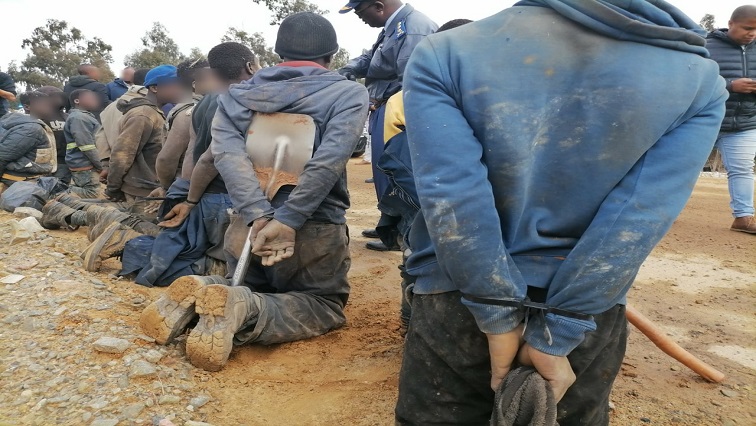News
Sheba Mine Crackdown: Over 500 Illegal Miners in Custody as Hunt Continues in Mpumalanga

A Gold Mine Turns Into a Crime Scene
What began as a police sweep has spiraled into one of the biggest illegal mining crackdowns South Africa has seen in years. As of this week, 518 people have been arrested at the Sheba Mine near Barberton, Mpumalanga, and authorities believe more could still be hiding underground.
On Tuesday, 494 suspects packed into the Barberton Magistrate’s Court, their fates temporarily hanging in the balance. They didn’t appear all at once—court officials had to bring them in batches of 50. The charges? Trespassing, illegal possession of gold-bearing material, and immigration violations.
It’s a full-blown operation that shines a spotlight on the growing dangers of illegal mining and the desperate livelihoods driving it.
More Emerge from Hiding as Food Supplies Cut Off
Just as the court processed the massive group, 24 more illegal miners emerged from hiding inside the Sheba Mine, bringing the total to 518 arrests. This sudden appearance wasn’t a coincidence. According to Mpumalanga SAPS spokesperson Brigadier Donald Mdluli, the miners surfaced after police disrupted their food supply.
“There is a firearm that was confiscated from one of the suspects,” Mdluli confirmed. “We are expecting more [to emerge], but that depends on re-planning, re-assessing, and bringing in more resources.”
It’s a high-stakes waiting game, where the only exits for those still underground are either surrender or starvation.
Who Are the Illegal Miners?
Most of the arrested individuals are foreign nationals from eSwatini and Mozambique. Among them are minors, adding to the humanitarian complexity of the situation. Of the 494 already in court, only 26 suspects were granted R2,000 bail, they were the few who had fixed South African addresses. The rest remain behind bars.
This reflects a broader regional issue: cross-border migration driven by economic hardship, funneled into dangerous, unregulated work in abandoned or privately-owned mines.
Operation Vala Umgodi: A National Push Against Zama Zamas
These arrests are part of the SAPS’ nationwide Operation Vala Umgodi, launched to stamp out illegal mining, commonly associated with zama zamas, a term widely used in South Africa for informal or artisanal miners, many of whom work in perilous conditions with little legal protection.
While the public has grown used to hearing about zama zamas in places like Gauteng and Free State, Mpumalanga’s gold-rich hills have become the latest frontier.
Community Shock, Online Outrage
Locals in Barberton, a town with a rich mining history, are rattled. What was once known as one of South Africa’s oldest gold-mining hubs is now associated with crime scenes, police tape, and court backlogs.
On social media, residents are demanding stricter border control and better regulation of mining operations. Some are expressing sympathy for the arrested miners, citing economic desperation and lack of opportunity in their home countries. Others want swift deportations and stricter policing.
What Happens Next?
The matter has been postponed until August 11, giving the state more time to investigate and determine how to proceed with such a large number of detainees. Meanwhile, security at Sheba Mine has tightened, and reinforcements may be sent in to flush out any remaining miners underground.
This incident forces a reckoning, not just with illegal mining, but with the social, economic, and cross-border pressures fueling it.
South Africa’s gold may glitter, but beneath the surface, it’s revealing cracks in our immigration system, mining oversight, and rural economies. The Sheba Mine saga is far from over and how we respond will shape the national conversation on mining and migration for years to come.
{Source: IOL}
Follow Joburg ETC on Facebook, Twitter , TikTok and Instagram
For more News in Johannesburg, visit joburgetc.com



























